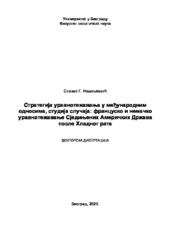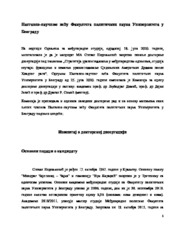Приказ основних података о дисертацији
Стратегија уравнотежавања у међународним односима, студија случаја: француско и немачко уравнотежавање Сједињених Америчких Држава после Хладног рата
Balancing strategy in international relations, case study: French and German balancing against the United States after the Cold War
| dc.contributor.advisor | Simić, Dragan | |
| dc.creator | Nedeljković, Stevan | |
| dc.date.accessioned | 2021-03-23T10:30:58Z | |
| dc.date.available | 2021-03-23T10:30:58Z | |
| dc.date.issued | 2020-10-07 | |
| dc.identifier.uri | http://eteze.bg.ac.rs/application/showtheses?thesesId=8002 | |
| dc.identifier.uri | https://fedorabg.bg.ac.rs/fedora/get/o:23386/bdef:Content/download | |
| dc.identifier.uri | http://vbs.rs/scripts/cobiss?command=DISPLAY&base=70036&RID=33656073 | |
| dc.identifier.uri | https://nardus.mpn.gov.rs/handle/123456789/18163 | |
| dc.description.abstract | Одсуство тврдог или традиционалног уравнотежавања против Сједињених Америчких држава после Хладног рата покренуло је широку дебату о одрживости кључних поставки теорије равнотеже снага. Овај докторски рат је покушај давања доприноса тој теоријској дебати. Аутор сматра да највећи број критика равнотеже снага проистиче из погрешних претпоставки о њеној универзалности и истоветности са природним законима. Када се ставови о њој као ”универзалном историјском закону” одбаце и сведу на оквир теорије, добија се знатно јаснија слика о дометима и мањкавостима концепта. У раду се тврди да равнотежа снага, упркос неупитним аномалијама, остаје кључни концепт у реалистичком ”теоријском топу” и у 21. столећу. Истовремено се указује да еволуира и добија нове облике испољавања. Концепт равнотеже снага има тројако значење. Користити се истовремено да означи систем равнотеже снага, стање равнотеже и стратегију уравнотежавања. С обзиром на тему доктората, највише простора ће бити посвећено уравнотежавању. У разумевању ове стратегије се ослањамо на теорију равнотеже претњи коју износи Стивен Волт. Волт тврди да велике силе не уравнотежавају увек државу која је најмоћнија, већ ону која представља највећу претњу, односно, која на основу своје моћи, географских одлика, офанзивних способности и агресивних намера представља највећи изазов њиховом опстанку и безбедности. Вршимо и једну допуну теорије тврдећи да државе конструишу претњу не само на основу опажања намера друге силе, већ и њеног деловања. Такође, за разлику од Волта који уочава постојање тврдог и меког уравнотежавања, указујемо да постоји и трећи облик који називамо ”уравнотежавање ниског интензитета”. ”Уравнотежавање ниског интензитета” дефинишемо као стратегију ”тихог отпора” у којој краткорочни циљ није насилна промена структуре међународног система или директно супротстављање надмоћној сили, већ суочавање са могућношћу подривања основа њене меке моћи и легитимитета. Државе које предузимају ову стратегију испољавају подозривост према природи моћи униполарне силе и својом реториком показују незадовољство структуром међународног система са једном државом на врху пирамиде моћи. На основу теорије равнотеже претњи и три врсте уравнотежавања настојаћемо да конструишемо теоријски модел одговора других великих сила на претње најмоћније силе у међународном систему. Полазећи од тога да државе обитавају у анархичном свету у коме влада систем самопомоћи, оне никада не могу бити сигурне у намере других актера међународних односа, поготову не у намере најмоћније силе. Зато ће против надмоћне силе у (хегемона или потенцијалног хегемона) који упражњава мултилатерално-институционални приступ у решавању глобалних изазова проблема бити, од стране других великих сила, покренуто уравнотежавање ниског интензитета. Уколико најмоћнија сила у систему делује агресивно и унилатерално и угрожава ”мање важне националне интересе” (Андреја Милетић) потенцијалних такмаца, против ње ће бити покренути механизми меког уравнотежавања и на крају, уколико најмоћнија сила у систему угрожава опстанак, безбедност и/или остале виталне интересе других великих сила, против ње ће бити покренути механизми тврдог уравнотежавања. Теоријске наводе проверићемо истражујући промене у француским и немачким стратегијама уравнотежавања Сједињених Америчких Држава после Хладног рата. Најпре ће бити истраживани основни чиниоци моћи и основне одлике спољне и безбедносне политике САД од 1989. до 2019. године, а затим ће бити спроведена анализа односа Француске и Немачке са САД у пост-хладноратовском раздобљу. Односи ових држава биће анализирани кроз четири студије случаја (Криза на Косову и Метохији 1998-1999, припреме за рат и Рат у Ираку 2002-2003, преговори о иранском нуклеарном програму 2006-2015. и анализа процеса 5 америчког напуштања Иранског нуклеарног споразума 2017-2018). Настојаћемо да докажемо да амерички агресивни унилатерализам (независна варијабла, узрок) доводи до повећања осећаја претње код потенцијалних такмаца (посредујућа варијабла), а да повећање осећаја претње даље води до појачаног уравнотежавања САД од стране Француске и Немачке (зависна варијабла, последица). Додатно, истражићемо како је агресивни унилатерализам Сједињених Држава утицао на спољне и безбедносне политике Француске и Немачке, а на крају ћемо покушати да предвидимо обрасце односа ових држава у будућности | sr |
| dc.description.abstract | a wide debate about the viability of the key assumptions of the balance of power theory. The doctoral thesis attempts to contribute to this theoretical debate. The author believes that most of the criticisms of the balance of power theory stem from wrong assumptions about its universality and commonality with natural laws. Once the claims about it as a “universal historical law” are rejected and reduced to the framework of theory, a much clearer picture of the scope and shortcomings of the concept of balance of power is obtained. The thesis argues that the balance of power, despite its unquestionable weaknesses, remains the key concept in the realistic “theoretical cannon” and the 21st century. Additionally, it is argued that the concept is evolving and taking new forms of manifestation. The concept of balance of power has a threefold meaning. It is simultaneously used to denote the balance of power system, the state of balance, and the balancing strategy. Given the topic of the thesis, most attention will be devoted to balancing. The understanding of the strategy relies on the theory of balance of threat proposed by Stephen Walt. Walt argues that great powers do not always balance against the most powerful state, but against the one which poses the greatest threat, that is, the one which, based on its power, geographical features, offensive abilities and aggressive intentions, poses the greatest challenge to their survival and security. We also make an original contribution to the theory by claiming that states construct threats based not only on the perceptions of another power’s intentions, but its actions as well. Also, unlike Volt, who notices the existence of hard and soft balancing, we argue that there exists a third form, which we call “low-intensity balancing”. “Low-intensity balancing” is defined as a strategy of “silent resistance” in which a short-term goal is not to violently change the structure of the international system or directly oppose a superior power but to face the possibility of undermining its soft power and legitimacy. The states that undertake this strategy demonstrate suspicion towards the nature of the power of the unipolar actor and rhetorically express dissatisfaction with the structure of the international system which has one state at the top of the power pyramid. Based on the balance of threat theory and three types of balancing, we propose a theoretical model of the response of other great powers to the threats of the most powerful one in the international system. Based on the starting assumption that states exist in an anarchic world governed by the system of self-help, they can never be sure of the intentions of other actors in international relations, especially not of the intentions of the most powerful actor. Therefore, low-intensity balancing will be initiated by other powers against the superior power (the hegemon or potential hegemon) which exercises a multilateral-institutional approach in solving the global challenges and problems. If the most powerful actor in the system acts aggressively and unilaterally, endangering the “less important national interests” (Andreja Miletić) of potential competitors, soft balancing mechanisms will be initiated against it, and, finally, if the most powerful actor in the system endangers survival, security and/or other vital interests of other great powers, hard balancing mechanisms will be launched against it. 7 We will verify the theoretical assumptions by investigating changes in the French and German balancing strategies against the United States after the Cold War. First, the basic factors of power and basic features of the foreign and security policy of the United States from 1989 to 2019 will be investigated, and then an analysis of the relations between France and Germany with the United States in the post-Cold War period will be conducted. The relations of these countries will be analysed through four case studies (the crisis in Kosovo and Metohija 1998 – 1999, preparations for the war and the War in Iraq 2002 – 2003, negotiations on Iran’s Nuclear Program 2006 – 2015, and the process of US withdrawal from the Iran Nuclear Deal 2017 – 2018). We strive to prove that the aggressive unilateralism of United States (independent variable, cause) leads to an increase in the sense of threat among potential competitors (intervening variable), while such increase in the sense of threat further leads to an increased balancing against the United States by France and Germany (dependent variable, consequence). Additionally, we investigate how aggressive unilateralism of the United States has affected the foreign and security policies of France and Germany, ultimately trying to predict the future patterns of relations between these states | en |
| dc.format | application/pdf | |
| dc.language | sr | |
| dc.publisher | Универзитет у Београду, Факултет политичких наука | sr |
| dc.rights | openAccess | en |
| dc.rights.uri | https://creativecommons.org/licenses/by-nc/4.0/ | |
| dc.source | Универзитет у Београду | sr |
| dc.subject | стратегија уравнотежавања | sr |
| dc.subject | balancing strategy | en |
| dc.subject | равнотежа претњи | sr |
| dc.subject | уравнотежавање ниског интензитета | sr |
| dc.subject | Сједињене Државе | sr |
| dc.subject | Француска | sr |
| dc.subject | Немачка | sr |
| dc.subject | balance of threat | en |
| dc.subject | low-intensity balancing | en |
| dc.subject | United States | en |
| dc.subject | France, Germany | en |
| dc.title | Стратегија уравнотежавања у међународним односима, студија случаја: француско и немачко уравнотежавање Сједињених Америчких Држава после Хладног рата | sr |
| dc.title.alternative | Balancing strategy in international relations, case study: French and German balancing against the United States after the Cold War | en |
| dc.type | PhD thesis | |
| dc.rights.license | BY-NC | |
| dcterms.abstract | Симић, Драган; Недељковић, Стеван; Strategija uravnotežavanja u međunarodnim odnosima, studija slučaja: francusko i nemačko uravnotežavanje Sjedinjenih Američkih Država posle Hladnog rata; | |
| dc.identifier.fulltext | https://nardus.mpn.gov.rs/bitstream/id/70406/Disertacija.pdf | |
| dc.identifier.fulltext | https://nardus.mpn.gov.rs/bitstream/id/70407/IzvestajKomisije28514.pdf | |
| dc.identifier.rcub | https://hdl.handle.net/21.15107/rcub_nardus_18163 |



